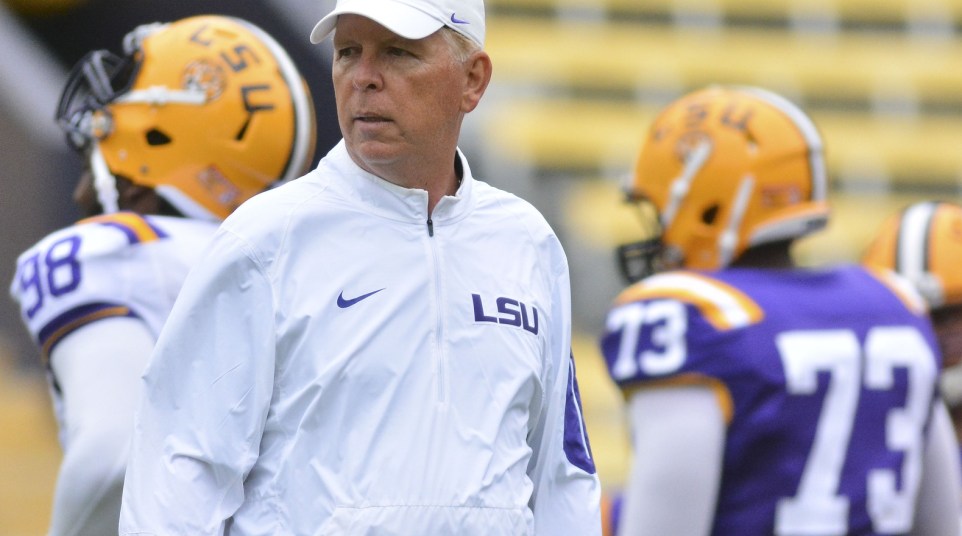
Is this a make-or-break year for LSU's Cam Cameron?
BATON ROUGE, La. –Leonard Fournette was surrounded by more than the usual gaggle of reporters on Monday.
Heisman Trophy candidates draw that attention.
But what Fournette was often asked about wasn’t always about the sky-high expectations of a star running back that could deliver on those hopes, but more about whether he would get more help doing it.
For that, Fournette said “you’ll have to see Saturday.”
Indeed.
LSU’s potent rush offense — the Tigers led the SEC in rushing last year, and Fournette led the nation in rushing yards per game — has not been balanced with an equally dangerous pass offense for years. That, as usual, is all the talk as the season opener against Wisconsin looms on Saturday.
If it’s still top-heavy with the run, that may be good for Fournette’s statistics — he toted the rock 300 times last year in 12 games. But it may not be good for Cam Cameron’s future as offensive coordinator.
When Cameron became LSU’s offensive’s coordinator in 2013, the complaint was that LSU’s offense, while effective against most opponents, would go into neutral against equally talented defenses. If teams could stop the run, they could stop the Tigers.
Case in point: The outstanding 2011 team, which in eight quarters and overtime in two games against Alabama managed just three field goals and was shut out 21-0 in the BCS National Championship Game.
This was an offense that was a respectable sixth in the SEC in total offense and second in the league in scoring offense, yet could not score a touchdown in eight quarters, plus overtime, against the toughest team on its schedule.
Three years later, those shutdown games are still a recurring issue for the Tigers, and one has to wonder if Cameron may be the man to pay if LSU’s offense doesn’t reach a level of consistency this year.
Three years into his tenure, the Tigers have not finished better than sixth in the SEC in scoring, and in the last two years, finished dead last and 11th in the league in passing offense.
Worse than that has been the continued trend that, against quality opponents, the Tigers’ offense might go from overdrive to neutral. For all of his credentials, Cameron has not stopped the offense from having repeats of the meltdown in that 2011 BCS title game.
In 2014, it was the back-to-back losses to Alabama and Arkansas, where the Tigers managed just 382 yards of offense combined. In neither game did the Tigers reach 100 passing yards.
Last year, it was the anemic 182 yards the Tigers came up with in the 30-16 loss at Alabama. This was the same offense that put up 624 yards against South Carolina.
The common theme? Alabama.
So as good as Fournette is, it’s not his otherwordly talents that could ultimately save Cameron and put LSU’s offense back in an elite status.
If Cameron is going to get the offense where it needs to be, it will have to be through the development of quarterback Brandon Harris and the passing game.
Against Alabama last year, Harris completed just 6-of-19 passes and showed he wasn’t ready yet to step up against the big-time competition when those teams were able to stop Fournette. The Tide held him to 31 yards on 19 carries in that game.
That lack of ability to have some versatility on offense put head coach Les Miles on the hot seat. He survived and is probably safe for now.
But if LSU continues to struggle against the highest quality opponents, will Cameron continue to be safe? Will the outside pressure lead to the offensive coordinator taking the fall?
Probably, and it’s a familiar spot for Cameron.
In 2012, Cameron was the offensive coordinator of the Baltimore Ravens and was fired after a slow start. Jim Caldwell replaced him, the Ravens got hot and, behind the play of Joe Flacco, went on to win the Super Bowl.
Cameron deserves at least some of the credit for that offense’s development. But college football does not give a team mulligans to use in its playoff system. LSU has to be good in the opener against Wisconsin. It has to be good in early SEC games against Mississippi State and Auburn.
And, yes, it has to be good against Alabama.
And by good, that means not one-dimensional.
There’s reason to think that could happen. Harris is Cameron’s first returning starter at quarterback since his first year at LSU, when he inherited second-year starter Zach Mettenberger. Cameron groomed Mettenberger into a 3,000-yard passer and LSU had its best offense since its national championship team in 2007.
It was quite a honeymoon for Cameron.
But since then, there was one bad year of Anthony Jennings as starter when LSU was last in the SEC in passing, then a growing pains season with Harris as a starter.
Harris has all the tools to succeed. He has a big arm, he’s elusive and he now has experience.
Can Cameron turn him into a quarterback ready to deliver in big games?
Fournette could sure use the help. And, for his career, maybe Cameron could also.
